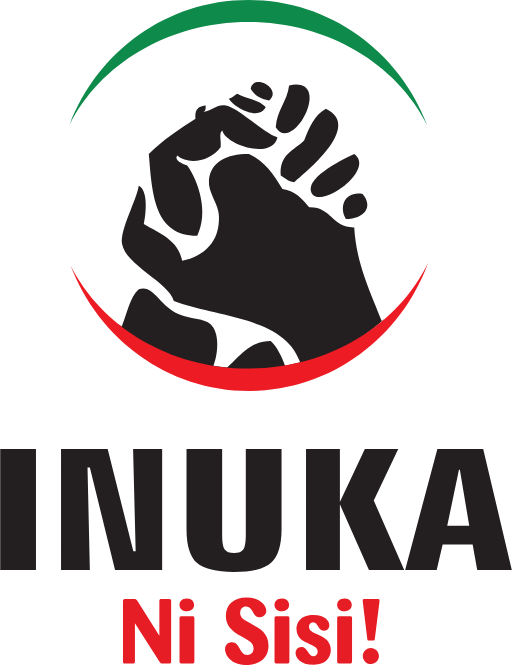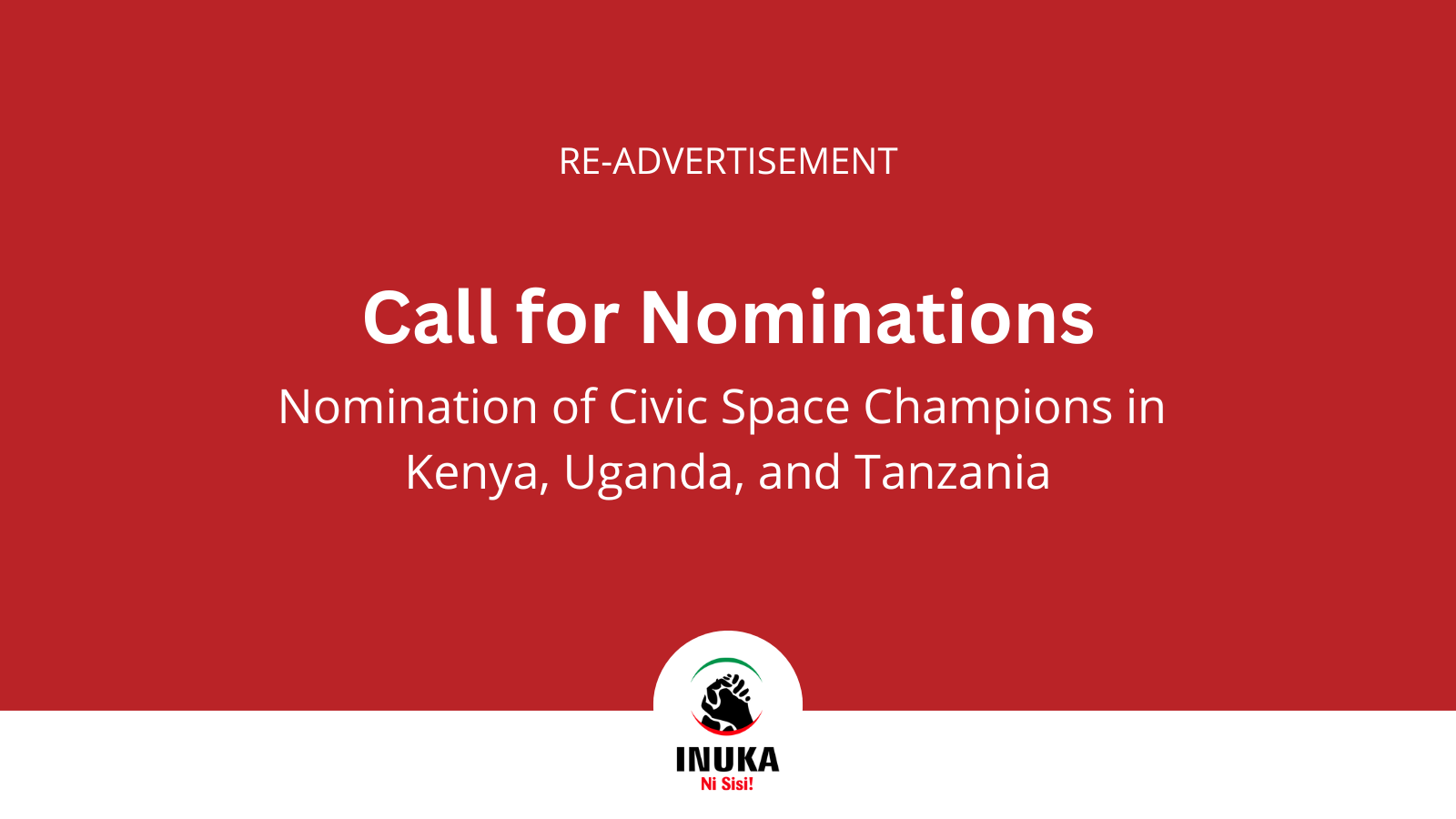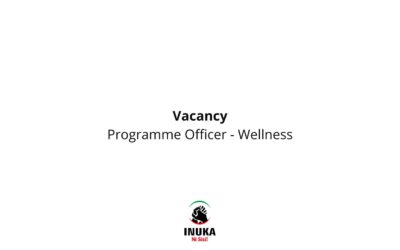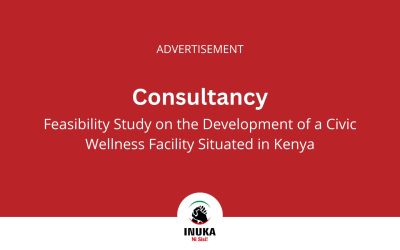Inuka Kenya conducted a study on Shrinking Civic Space between December 2023 and February 2024 in Kenya, Tanzania, and Uganda. The study was informed by the need to create a knowledge base for advocacy on civic space. Civil Society Organizations (CSOs) are at the forefront of these challenges, experiencing heightened risks such as forced disappearances, threats, violence, and in some cases, targeted killings—often believed to be carried out by government or ruling party operatives, or national security agencies.
The study recommended that civil society must strengthen knowledge-building and evidence-based advocacy, engage in continuous and targeted capacity assessment, and building in view of changing civic space dynamics. Also, civil society must build coalitions and networks nationally, regionally and internationally, diversify its resource bases and design and implement strategic national and regional responses to civic space infringements. It is critical also to invest in technology, strengthen security training and programming and increase community outreach and constituency building. CSOs must also develop a crisis-response plan, which includes cultivating support from among government officials as an early warning plan. It is on the basis of this that Inuka Kenya seeks to identify, support, and amplify champions—two (2) individuals per country who lead and inspire resilient civil society initiatives.
Inuka seeks to:
Identify individuals demonstrating strong leadership and commitment to civil society resilience in Kenya, Uganda and Tanzania.
Commitment to civil society resilience in this context refers to an individual’s sustained efforts to strengthen and protect civic spaces, grassroots movements, and democratic participation, even in the face of challenges such as government restrictions, funding shortages, or social opposition. It includes:
- Defending Civic Space & Rights – Advocating for freedoms and human rights, ensuring that civil society organizations (CSOs) operate without undue restrictions.
- Sustained Engagement in Advocacy & Governance – Actively participating in policy reforms, social justice movements, and human rights campaigns to enhance accountability and transparency.
- Capacity Building & Grassroots Mobilization – Strengthening local communities by providing knowledge, tools, and platforms for civic engagement and empowerment.
- Innovation & Adaptability – Developing new approaches to activism, governance, and community engagement, leveraging technology and creative strategies to overcome challenges.
- Collaboration & Solidarity – Building networks across different sectors (civil society, academia, private sector, and government) to amplify impact and sustain long-term change.
Champion Characteristics:
- Deep commitment to community engagement and societal change.
- Ability to mobilize resources and build collaborative networks.
- Proven track record of resilience in the face of challenges.
- Strong communication skills and capacity to influence public opinion.
- Alignment with the values and strategic goals of the civil society organization.
Competency Measures for Champion Characteristics
Commitment to Community Engagement & Societal Change
- Evidence of past participation in community projects, advocacy, or policy initiatives. • Number of initiatives led or contributed to that resulted in tangible social impact. • Testimonials or endorsements from community members and peers.
Resource Mobilization & Network Building
- Ability to secure funding, partnerships, or in-kind support for initiatives.
- Demonstrated history of collaboration with multiple stakeholders (e.g., NGOs, government, grassroots organizations).
- Size and diversity of the network engaged in past projects.
Resilience & Adaptability
- Ability to navigate setbacks and continue working toward objectives.
- Case studies or examples showcasing problem-solving in challenging situations. • Self-assessment or peer feedback on handling pressure and adversity.
Communication & Public Influence
- Public speaking engagements, media appearances, or published articles.
- Social media reach and engagement on advocacy-related content.
- Ability to articulate complex issues in a way that resonates with diverse audiences. Alignment with Civil Society Values & Strategic Goals
- Demonstrated commitment to human rights, social justice, and democratic values. • Consistency of past work with the organization’s mission and vision.
- Willingness to work within the ethical and operational frameworks of the civil society sector.
Identification Criteria
- Core Competencies:
- Commitment: Demonstrated passion and long-term involvement in civil society issues.
- Influence: Ability to inspire others, backed by a strong network of supporters.
- Innovation: Track record of creative solutions and adaptability to challenges.
- Communication: Proficiency in articulating ideas, both verbally and through digital channels.
- Integrity: High ethical standards and alignment with organizational values.
Competency Measures for Core Competencies
Commitment (Passion & Long-term Involvement in Civil Society Issues)
- Years of active participation in civil society initiatives, campaigns, or organizations. o Number of projects or advocacy efforts sustained over time.
- Testimonials from colleagues, beneficiaries, or partners confirming dedication.
- Evidence of continuous learning (e.g., training, certifications, thought leadership in relevant areas).
Influence (Ability to Inspire & Mobilize Others)
- Size and diversity of the network actively engaged in advocacy or social change efforts.
- Demonstrated history of mobilizing communities, volunteers, or stakeholders for a cause.
- Media presence, public speaking engagements, or published content influencing public discourse.
- Social media engagement metrics (e.g., reach, shares, meaningful interactions on advocacy content).
Innovation (Creative Problem-Solving & Adaptability)
- Case studies or examples of innovative solutions implemented in past projects. o Ability to pivot and adjust strategies in response to challenges or emerging issues. o Feedback from peers or supervisors on the effectiveness of problem-solving skills. o Recognition or awards for innovative contributions to civil society or advocacy work. 4. Communication (Articulation of Ideas & Digital Proficiency)
- Public speaking experience, clarity, and ability to engage diverse audiences. o Published articles, blog posts, or policy papers demonstrating thought leadership. o Digital communication effectiveness (e.g., social media advocacy, use of multimedia). o Feedback from stakeholders on the clarity and impact of messaging.
Integrity (Ethical Standards & Alignment with Organizational Values)
- Reputation for ethical behavior and transparency in decision-making.
- Endorsements or references from respected figures in civil society.
- No history of misconduct, conflicts of interest, or actions contrary to stated values. o Willingness to adhere to governance, compliance, and accountability standards in civil society work.
If you know any individual who meets this criteria, you are invited to nominate them through this form: https://forms.gle/w8A9VmTuu64Ab98z7




